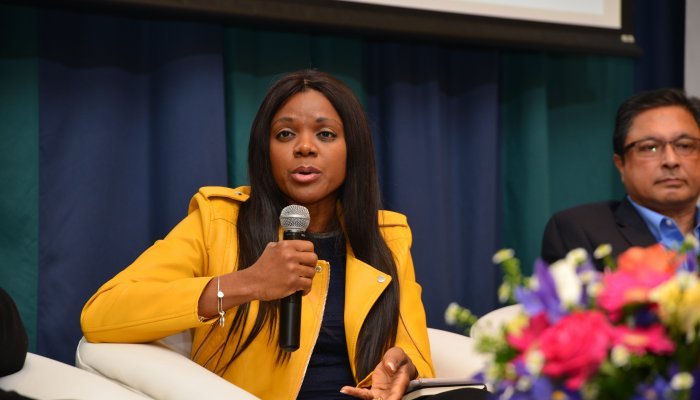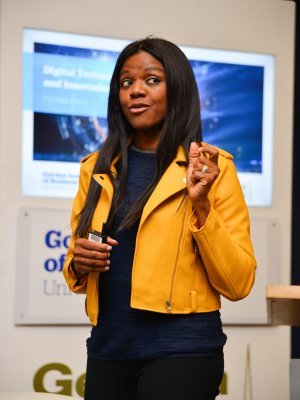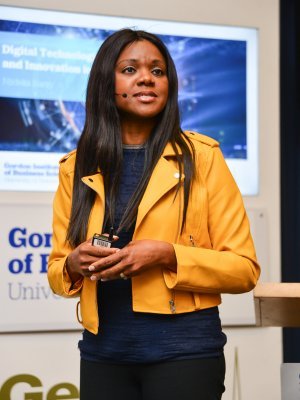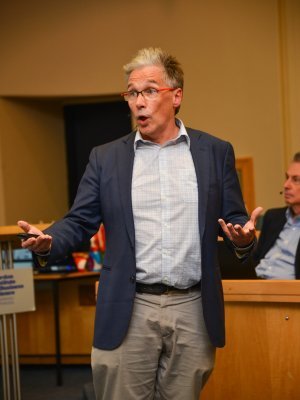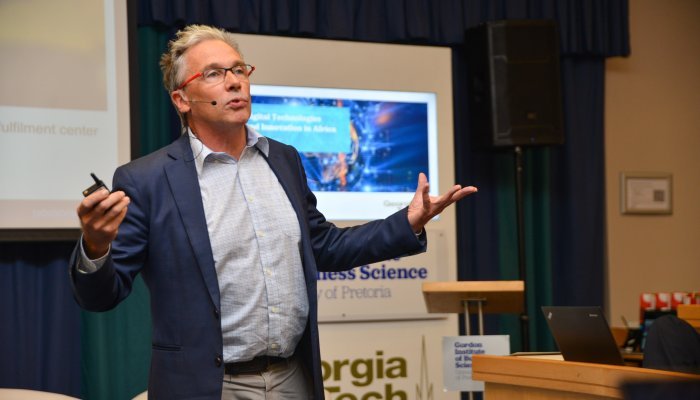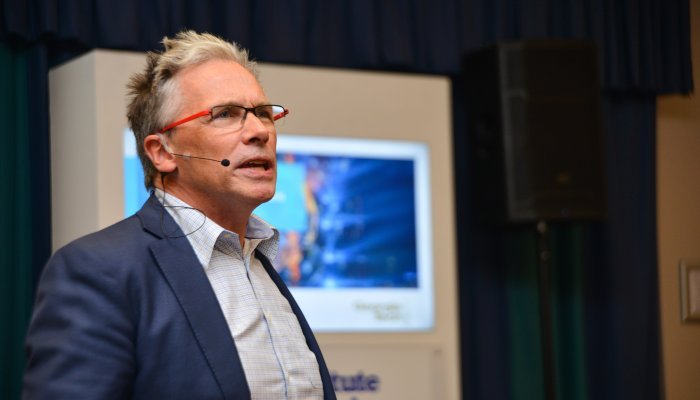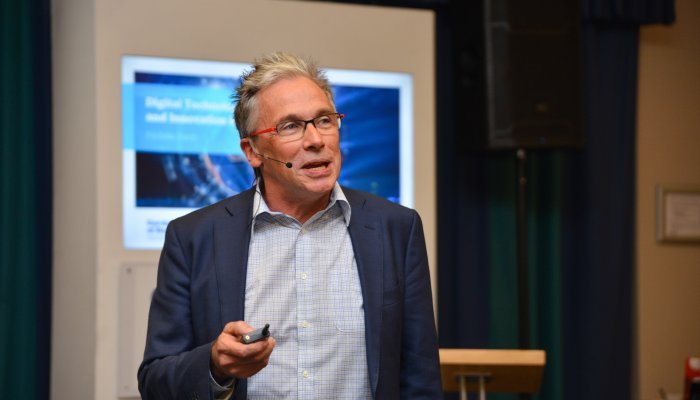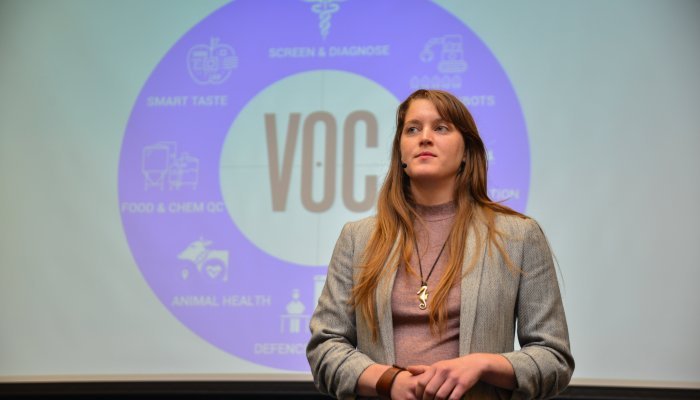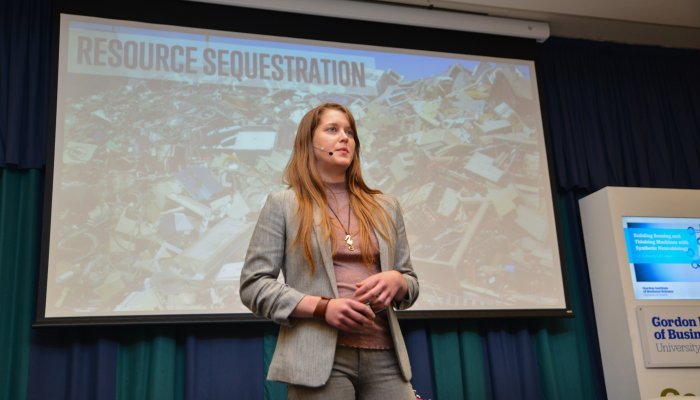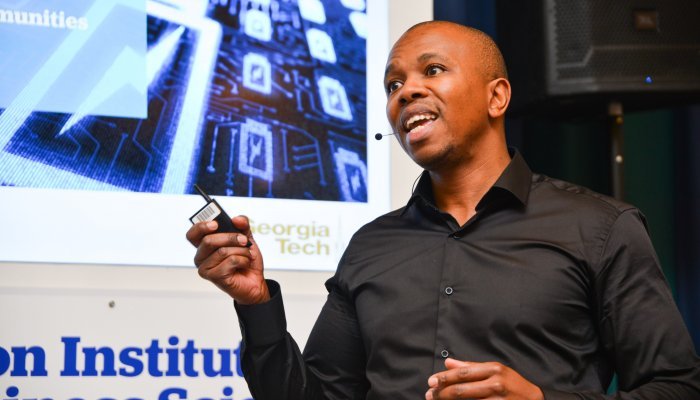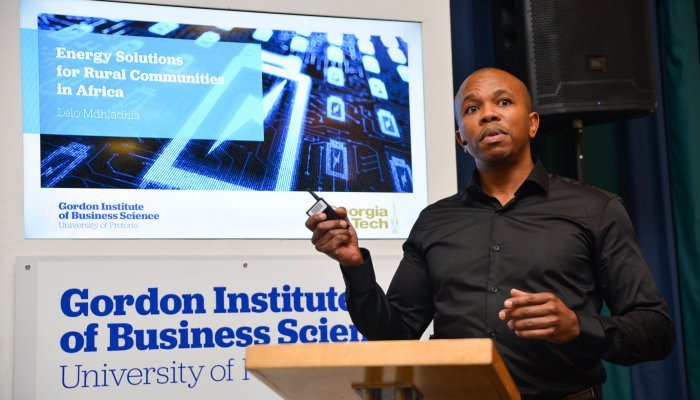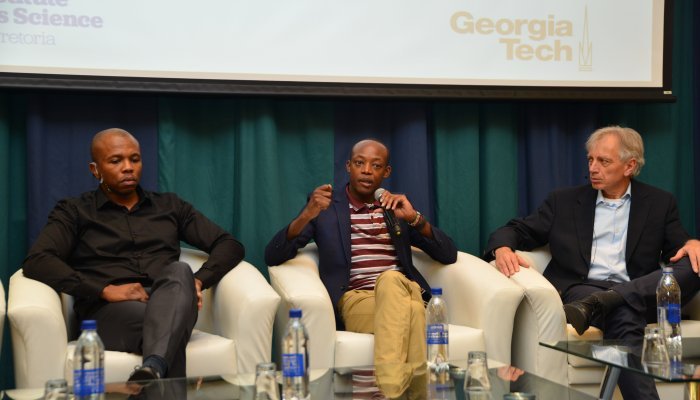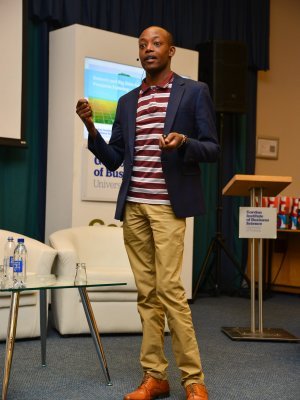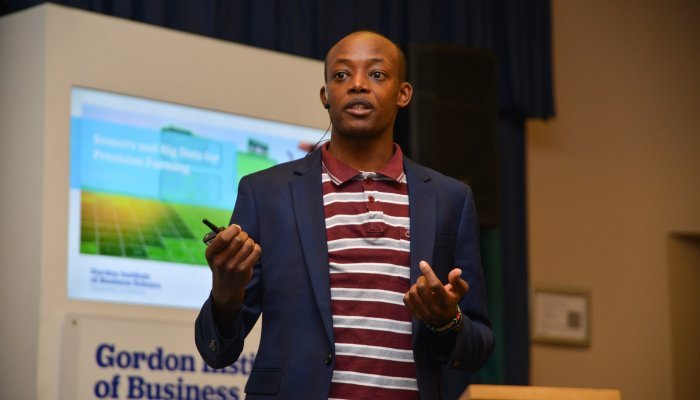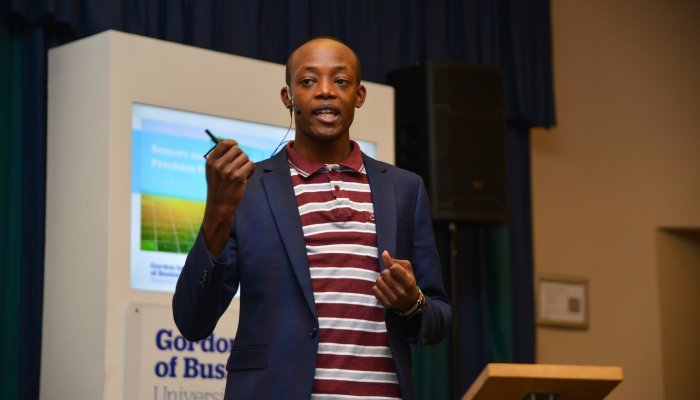Key themes in evidence during the conference included using technology to benefit society and ensuring that Africa’s solutions were not only imported from developed nations, but were rather developed on the ground by Africans, and for Africans. Management consultant and GIBS lecturer Manoj Chiba, highlighted this when he said: “The West is using technology to create new markets, while Africa needs to look at how to solve the continent’s needs.” He called on Africa to leverage technology to better serve its citizens.
Over the two days, various technological interventions were discussed, as was the impact these would have on African people and communities. Nigerian social entrepreneur and CEO of Youth For Technology, Njideka Harry, said she was driven to start her organisation after moving to the United States in the early 2000s to study. “The thing that stood out most to me was not race or cultural differences but rather technology,” said Harry, whose organisation brings technology to schools in Nigeria and Kenya.
Even 20 years ago, the difference around how American children were adapting to technology compared with their African counterparts was stark. Harry’s organisation started out by addressing the issues of simple computer literacy, but it has evolved to teach African learners to code and innovate in order to come up with solutions to the problems facing their own communities.
But the need for education around tech goes beyond preparing the future generations for 4IR. It is also essential when it comes to Africans participating in this new revolution. Urologist Dr. Evangelos Apostoleris stressed that education was critically important both to operate technology and get the most out of it. Indeed, the repeated call for better education across primary, secondary and tertiary education was made by most speakers.
The reality of the continent’s ability to adopt and use technology was made by Dr. Bitange Ndemo, Associate Professor of Entrepreneurship at the University of Nairobi’s business school and chairman of the Blockchain and Artificial Intelligence Taskforce for the Kenyan government, who lamented that only six African countries were ready to exploit 4IR. “If we miss this revolution, we will never catch up to the world,” he warned.
Powering Africa
Currently around 650 million Africans do not have access to power and only 44% of the continent is electrified. Dr. Pascal Van Hentenryck, Georgia Tech’s A. Russell Chandler III chair and professor, noted: “Solving the world’s energy needs is our biggest challenge. We are lucky, however, that there are many cost-effective solutions which are fast becoming cheaper than coal.”
Mpumelelo Mdhladhla, chief marketing officer at POWERX, showcased some of the work being done within the continent’s rural communities. Critically, these initiatives are giving people access to power through solar and methane gas installations; enabling rural households to generate income and start microbusinesses, enjoy access to media platforms such as television, radio and mobile, and enable their children to read and do homework at night. In addition, having power means that toxic fumes generated by kerosene, wood and coal fires are eliminated from their homes and surrounds – furthermore, on a macro scale, damage to the environment through deforestation and climate change is also being mitigated.
Access to finance and affordability were both raised during this discussion, as Mdhladhla highlighted M-Kopa Solar and Azuri, two solar power initiatives that offer affordable repayment models with ultimate ownership of the systems.
Mdhladhla called on Africa to be nimble when it came to adopting innovative power solutions but said that most of Africa had an advantage because well-developed infrastructure could act as an inhibitor to the introduction of new innovative infrastructure models. Because of this, he noted: “Africa is going to be at the forefront of energy technology.”
But if Africa really wants to benefit from the latest trends in power generation, then it can be argued that it needs to have a bigger vision than simply supplying small-household solutions. Van Hentenryck shared his insights around larger scale, emerging energy solutions that could empower and power Africa on an industrial scale.
In addition to giant renewable energy plants, Van Hentenryck said microgrids were the way of the future. Microgrids are mini power solutions designed to power a factory, a mine, a small town or even suburbs or communities. What this means for power supply is that a country would not have to invest in the thousands of kilometres of power lines and could, rather, have a power generating plant at the site where the power is consumed. Not only would this prove cheaper than building, running and maintaining a national grid, but microgrids could be built in such a way that citizens could access affordable payment systems and choose when and how they access power. Van Hentenryck used the Remba Island microgrid on Lake Victoria, Kenya, as an excellent case study for Africa. He concluded by saying: “Microgrids are the future and the disruption is easier to do in an Africa than other regions, so there are loads of opportunities to for investors.”
The future of tech in Africa
In addition to advances in power generation, the research and development of technological advances coming out of some of the world’s best universities are potentially game changing for Africa.
Two areas where tech is noticeably improving life for Africans is in the medical space, through better scanning and surgical equipment, and in fintech, where the impact of mobile money and cryptocurrencies are already evident across the continent.
But primary industries, like farming, are also poised to benefit greatly from enhanced technologies. In Kenya, tech company UjuziKilimo is helping small-scale farmers by using soon-to-be patented sensors that can measure the health of the soil via a five-minute scan. The company then sends feedback to the farmers about how to treat and fertilise the soils, gives tips about the crops best suited to their type of soil and what to do at various stages of the growing cycle, as well as up-to-date weather information. Co-founder and CEO of UjuziKilimo, Brian Bosire, says that although the company is young, their data shows it is having a positive impact on the farmers they serve.
In addition, larger global solutions to farming are also available to the continent’s commercial farmers. Dr. Peter Corke, Professor of Robotics at Queensland University of Technology, explained how the robots they are developing are not only more productive on commercial farms, but are smarter and degrade the land less than the giant machinery farmers are currently using. They are also cheaper and reduce farming input costs such as fertiliser, herbicides and pesticides.
Dr. Kenneth Oye, director of the MIT Program on Emerging Technologies, shared a number of biological advances he believed will be invaluable to African agriculture. One solution is the creation of saline-resistant plants, which will ultimately allow farmers to irrigate plants with saline or brackish water. “Saline tolerance is a big problem that can be solved through innovation,” he said. In addition, plants can also potentially be used to create desalination facilities.
More controversial, perhaps, is the focus on enhancing outputs within animal husbandry. The genetic modification of Kashmir goats can result in them growing longer silkier fur, for example, while pigs may soon be bred to be resistant to swine flu.
Oye shared another controversial technology for which he has a passion: eradicating malaria through gene drives. Using genetic engineering, scientists can remove a specific gene, like the one that causes malaria in mosquitos, from an organism. Through the gene drive, they can then have a 95% certainty that the new genetic sequence will be passed on to the next generation. As such, in a very short space in time, a disease could be bred out of complete populations of a species.
And there are yet more technologies that may become increasingly important for business in Africa. Robotics, for example, can improve the safety on mines through doing the jobs that are unsafe for humans, explained Corke. Biotechnology, according to Dr. F. Kennedy McDaniel, chief of staff for biotech firm Koniku, said that their use of living cells to literally sniff out explosive substances used in bombs could be positive for national security. This technology would also work in anti-poaching initiatives.
McDaniel gave the example of genetically enhanced cells being able to identify unique ‘smells’ and thereby trace the origins of rhino horn, thus allowing authorities to prove that specific rhino horn products originated from a particular animal. This technology also has industrial uses, such as ensuring products like beer are always produced to a consistent standard and have the identical smell and taste from one batch to the next.
And while that may not seem like a pressing issue for Africa, how the continent adapts and uses this innovation to address local needs and challenges depends only on the African imagination.
Politically sound tech
While much of the technology highlighted over the two-day conference, especially the biological advances, had a ring of science fiction about it, one of the most important and impactful technologies impacting Africa could be something a little less fantastic. Nevertheless, it could still prove to be one of the most significant technological developments of our time: Blockchain.
During his presentation, Dr. Bitange Ndemo spoke about how blockchain will, in the future, prevent fraud and misrepresentation of political candidates running for election. He explained that records saved using blockchain technology could not be altered, ensuring that people who did not qualify to be political candidates could not bribe their way into office.
And this, ultimately, may be one of the biggest game changers for Africa. In fact, at the end of a jam-packed conference, Oye commented that he hoped the use of technology in Africa would lead to greater political accountability. “Look at the kleptocracies and patronage across the world. How can we use information technologies to prevent state failure to monitor corrupt officials?” he asked. “It’s a question that needs to be studied more deeply.”
KEY TAKEAWAYS
· Technology could hold the key to addressing issues particular to Africa.
· Education around tech is vitally important to prepare future generations for the Fourth Industrial Revolution.
· The issue of power generation is of vital importance across the continent.
· In addition to giant renewable energy plants, mini power solutions in the form of microgrids could be the way of the future.
· Technological advances coming out of some of the world’s best universities – from biotech to medical and agricultural solutions – could be potential game changers for Africa.


